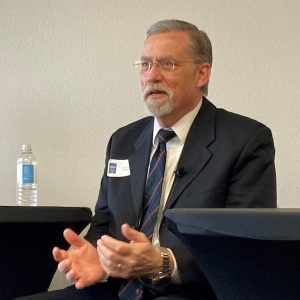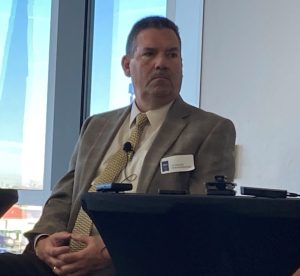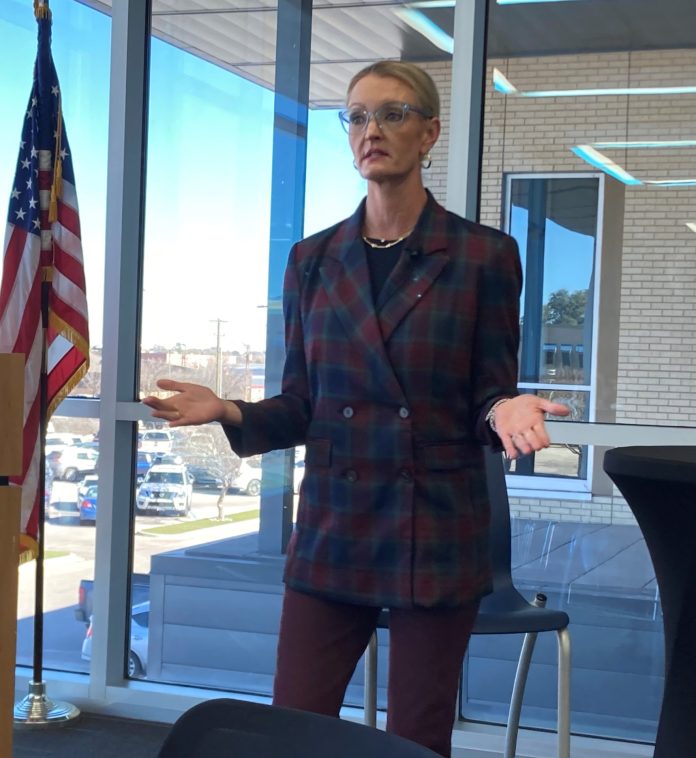Workforce is the engine that makes the Permian Basin’s economy go, but currently there are more jobs than people in the region so the Odessa Development Corporation on Thursday hosted a Workforce Summit in the Zant Room of the Saulsbury Campus Center at Odessa College.
Tracee Bentley, president and CEO of the Permian Strategic Partnership, gave the keynote address before more than 150 people from across the community. Bentley said workforce is the reason PSP was created and it’s likely the only one of its kind in the country. This lends itself to speaking to the importance of the Permian Basin.
The event was moderated by Drew Scheberle, executive director of the Texas Chamber of Commerce Executives.
“If you’re anywhere in the country, and arguably the world, but certainly in the country, needs to get workforce right, it is the Permian Basin.”
Bentley spoke about data and the need for workers in coming decades, how to organize the data and fill those workforce needs. She added that the region needs to do a better job of growing its own.
Ideally, students will have had a lot of different options growing up so it’s not a shock when they get to commencement.
Also, if the region focuses on grow our own, local programs and curriculum must be in place.
“I think we’re working on it, but we have a lot of room to grow,” Bentley said.
Having things like good pediatricians and schools, for example, helps draw people in and keeps them here.
By 2040, the Permian Basin region will be approximately 190,913 workers short. Rapidly growing occupations that support the area’s energy sector are engineering and engineering technicians; extraction workers; mechanics; and truck drivers.
“Even if we got all the high school graduates in West Texas and Eastern New Mexico to fill these job, we won’t have enough,” Bentley said.

By 2050, more than 300,000 workers will be needed. Some high-demand jobs in the Basin are accountants; people in management, business and finance; computer engineering and science; service; sales and related fields; office and administration support; construction and extraction; and nurses and other healthcare providers. Also mentioned is farming, fishing and forestry.
“COVID taught us we’re in a shortage of healthcare, but thankfully through our friends at Texas Tech and UTPB, we saw a gap. We went to work, unconventionally I would argue, but we put a program together, and so we’re increasing nurses; we’re increasing doctors; we’re increasing surgeons; we’re increasing behavioral health (all) through the existing, amazing partnerships that we have in academics,” Bentley said.
Currently, she said, oil and gas is 90 percent of the economy, but solid education, healthcare and infrastructure continue to progress and expand and be updated.
Bentley pointed to the accomplishments PSP has made with the help of its partners and the community. In its first five years, PSP has invested $160 million and leveraged that to $1.5 billion.
She noted that part of the Ector County ISD bond approved by voters Nov. 7 included a new career and technical education center. If any place needs a premier CTE facility it is Odessa, Bentley said.
“We are in the epicenter of CTE and so I am so excited that the voters passed it and that we get to move forward with that. You’re going to see PSP come on as a big partner in that, both with energy expertise and also with our dollars,” Bentley said.
The Permian Basin provides $181.8 billion a year in U.S. gross domestic product; 786,200 in U.S. jobs; and $3.4 billion in 2021 in tax collections.
There were panels on education and training, business, child care and housing. There were also roundtables on childcare solutions, employment vacancy solutions, Star Tech, Training grants/skills grants, success in the medical field, dual credit/accelerated programs and collaborations, and customized workforce training.
During the business panel, Cassidy McMorries Tapia, HR lead and recruiter for GCC, and John Jameson, regional vice president of Untied Supermarkets/Market Street, talked about language barriers.
Jameson said a lot of their back-of-house, kitchens and first-cut areas have a “great deal of Cubans” and there are some language barriers. He said they have started offering English as a second language classes. He added that a big percentage of his team is trying to learn Spanish, as well.
“It’s getting to be a bigger issue because guests come in and they’re needing to order an arrangement or order a cake and they can’t speak English, so it’s getting harder. We do get a lot of applicants, they’ve got to have their papers though,” so a lot of them can’t be hired, but some can.
“In certain areas like in produce and in our kitchens, I would say 25 or 30 are limited English,” Jameson said.
Tapia said her company doesn’t necessarily have that issue because they are governed under the Mine Safety and Health Administration, which is similar to the Occupational Safety and Health Administration. GCC is a leading producer of cement and concrete in the U.S. and Mexico.
“It is a requirement to understand basic English. There are a lot of safety issues that can happen out there if somebody can’t effectively communicate with the rest of the team. But we do provide sponsorship. We do have people that are coming in and out of Mexico, but there does have to be an expectation that they have to learn English,” Tapia said.
She added that if there is anybody offering conversational Spanish courses, she could use it.
“I don’t know if you’ve looked at the U.S. census … but it’s become predominantly more Spanish speaking … In America, we’re the only country that I can think of that doesn’t have to learn multiple languages and I think that yes I do understand the mentality that you do need to speak English, but … there’s a lot of people that speak different languages,” Tapia said.

On the education and training panel, which included Ector County ISD Superintendent Scott Muri, University of Texas Permian Basin President Sandra Woodley, Dr. Timothy Benton from Texas Tech University Health Sciences Center, and OC President Gregory Williams, Muri said 10 percent of the teacher workforce is international. He noted that 26 languages are spoken in the district.
“We have about 25 different countries that we hire from. In fact, literally right now I have a team of human resource folks in the Philippines. Yesterday, they hired 30 teachers that will be joining our team next year because, again, 10 percent of our teaching workforce comes from abroad. Our international community is very important to the work that happens locally because we simply aren’t producing enough,” Muri said.
He added that when he started in 2019, ECISD was 350 teachers short. Today, they have 38 teaching vacancies.
“The state of our system today is much improved. The state of our system tomorrow will be even better,” Muri said.
One of the shining stars of the bond passed in November, Muri said, is the new CTE building.
“We will do much of our job creation, our human capital building, in that space in partnership with Odessa College, so kids will have opportunities in a variety of pathways, including a brand-new energy pathway, which will be embedded in that new career and technical education facility to be trained in a world-class environment so they can transition,” Muri said.
Woodley said UTPB served about 7,500 students last year and graduated a little more than 1,300.
“But what we know from the data is … over the next several decades we’re going to be short 60,000 to 70,000 people who need a baccalaureate degree to fill the jobs here in the Permian Basin. The university has to grow. It has to be more complex. We believe that the university is going to have to grow into a Texas Tech-type university over the next several decades to be the university that’s going to be needed here in the Permian Basin,” Woodley said.
There are several things that need to be done to make that happen such as making sure its programs are responsive, making sure they look at data to understand what jobs are needed and make sure its programs and curriculum are responsible.
Woodley said they also have to grow the amenities of the university such as athletics.
“We have to become more of the first choice for the best and the brightest here in the Permian Basin to stay here because what happens is if they come to the university or to the college here, guess what? Most of them will stay here and work here and so being able to have the athletics and the student organizations that will allow the population and the potential population here to choose University of Texas Permian Basin is a workforce issue,” Woodley said.
Benton said TTUHSC trains core specialties here and has added fellowships. They have four currently — endocrinology, cardiology, pulmonology and critical care medicine. The last two will start in July 2024.




